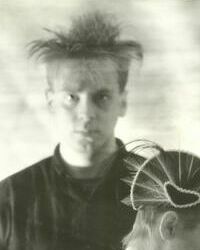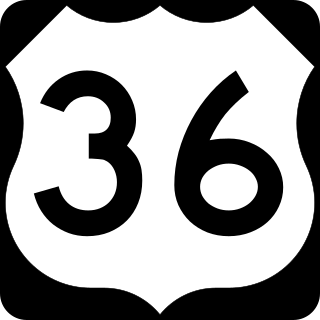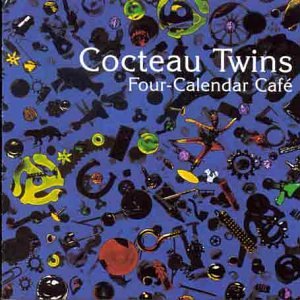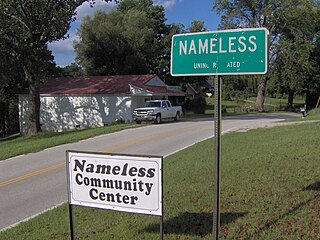
The Lincoln Highway is one of the first transcontinental highways in the United States and one of the first highways designed expressly for automobiles. Conceived in 1912 by Indiana entrepreneur Carl G. Fisher, and formally dedicated October 31, 1913, the Lincoln Highway runs coast-to-coast from Times Square in New York City west to Lincoln Park in San Francisco. The full route originally ran through 13 states: New York, New Jersey, Pennsylvania, Ohio, Indiana, Illinois, Iowa, Nebraska, Colorado, Wyoming, Utah, Nevada, and California. In 1915, the "Colorado Loop" was removed, and in 1928, a realignment routed the Lincoln Highway through the northern tip of West Virginia. Thus, there are 14 states, 128 counties, and more than 700 cities, towns, and villages through which the highway passed at some time in its history.

Cocteau Twins were a Scottish rock band active from 1979 to 1997. They were formed in Grangemouth on the Firth of Forth by Robin Guthrie and Will Heggie (bass), adding Elizabeth Fraser (vocals) in 1981. In 1983, Heggie was replaced with multi-instrumentalist Simon Raymonde. The group earned critical praise for their ethereal, effects-laden sound and the soprano vocals of Fraser, whose lyrics often eschew any recognisable language. They pioneered the 1980s alternative subgenre of dream pop and helped define what would become shoegaze.

Elizabeth Davidson Fraser is a Scottish singer. She was the vocalist for the band Cocteau Twins who achieved success in the UK primarily during the fifteen years from the mid-1980s to the late 1990s. Their studio albums Victorialand (1986) and Heaven or Las Vegas (1990) both reached the top ten of the UK Album Charts, as well as other albums including Blue Bell Knoll (1988), Four-Calendar Café (1993) and Milk & Kisses (1996) charting on the Billboard 200 album charts in the United States as well as the top 20 in the UK. She also performed as part of the 4AD group This Mortal Coil, including the successful 1983 single "Song to the Siren", and as a guest with Massive Attack on their 1998 hit single "Teardrop".
Tony Fletcher is a British music journalist best known for his biographies of drummer Keith Moon and the band R.E.M., and also as a show director for the Rock Academy in Woodstock.

Robert Waltrip Short was an American cabaret singer and pianist who interpreted songs by popular composers from the first half of the 20th century such as Rodgers and Hart, Cole Porter, Jerome Kern, Harold Arlen, Richard A. Whiting, Vernon Duke, Noël Coward and George and Ira Gershwin.

Simon Philip Raymonde is an English musician and record producer. He is the son of the late arranger and composer Ivor Raymonde. He is best known as the bass guitarist and keyboard player with the Scottish band Cocteau Twins from 1983 to 1997.

The Ridge-and-Valley Appalachians, also called the Ridge and Valley Province or the Valley and Ridge Appalachians, are a physiographic province of the larger Appalachian Highlands division. The physiographic province is divided into three sections: the Hudson Valley, the Central, and the Tennessee.

U.S. Route 6 (US 6) or U.S. Highway 6 (US 6), also called the Grand Army of the Republic Highway, honoring the American Civil War veterans association, is a main route of the United States Numbered Highway System. While it currently runs east-northeast from Bishop, California, to Provincetown, Massachusetts, the route has been modified several times. The highway's longest-lasting routing, from 1936 to 1964, had its western terminus at Long Beach, California. During this time, US 6 was the longest highway in the country.

U.S. Route 36 (US 36) is an east–west United States Numbered Highway that travels approximately 1,414 miles (2,276 km) from Rocky Mountain National Park, Colorado to Uhrichsville, Ohio. The highway's western terminus is at Deer Ridge Junction, an intersection in Rocky Mountain National Park, Colorado, where it meets US 34. Its eastern terminus is at US 250 in Uhrichsville, Ohio.

William Least Heat-Moon is an American travel writer and historian. He describes his heritage as English, Irish, and Osage. He is the author of several books which chronicle unusual journeys through the United States, including cross-country trips by boat and, in his best known work, about his journey in a 1975 Ford Econoline van.

Four-Calendar Café is the seventh studio album by Scottish band Cocteau Twins, released on 18 October 1993 by Fontana Records. It was their first release since leaving their former record label 4AD. Two singles were released to promote the album, "Evangeline" and "Bluebeard". A performance to promote "Bluebeard" on The Tonight Show with Jay Leno marked their debut performance on American television.

"Just Like Tom Thumb's Blues" is a song written and performed by Bob Dylan. It was originally recorded on August 2, 1965, and released on the album Highway 61 Revisited. The song was later released on the compilation album Bob Dylan's Greatest Hits Vol. II and as two separate live versions recorded at concerts in 1966: the first of which appeared on the B-side of Dylan's "I Want You" single, with the second being released on The Bootleg Series Vol. 4: Bob Dylan Live 1966, The "Royal Albert Hall" Concert. The song has been covered by many artists, including Gordon Lightfoot, Cat Power, Nina Simone, Barry McGuire, Judy Collins, Frankie Miller, Linda Ronstadt, the Grateful Dead, Neil Young, The Black Crowes, Townes Van Zandt, Bryan Ferry, and The Handsome Family. Lightfoot's version was recorded only weeks after Dylan's original had been released and reached #3 on the Canadian RPM singles chart.

A road trip, sometimes spelled roadtrip, is a long-distance journey traveled by car.
Bluebeard is the title character in a 1697 fairy-tale by Charles Perrault.
Blue Highway may refer to:

Down Under is the British title of a 2000 travelogue book about Australia written by best-selling travel writer Bill Bryson. In the United States and Canada it was published titled In a Sunburned Country, a title taken from the famous Australian poem, "My Country". It was also published as part of Walk About, which included Down Under and another of Bryson's books, A Walk in the Woods: Rediscovering America on the Appalachian Trail, in one volume.

Nameless is an unincorporated community in Jackson County, Tennessee, United States.

The Buffalo Chip Campground is an event venue in Meade County, South Dakota, United States. The campground is a place for motorcycle enthusiasts and music festival visitors each year, and has been since its founding in 1981. Host to a 10-day Concert Series and thousands of motorcyclists each August during the annual Sturgis Motorcycle Rally, the Buffalo Chip provides a music festival, various other forms of entertainment, and full service tent, RV and cabin camping on almost 600 acres in rural Meade County. The motorcycle and music festival also features entertainment including multiple disciplines of racing, exhibits, beauty pageants, dance performances, bike shows, world-record-breaking stunts, midget bowling, and military tributes.

Frenchman, also known as Frenchman's Station or Bermond, was a community in Churchill County, Nevada, United States. Frenchman was located along U.S. Route 50 30 miles (48 km) east-southeast of Fallon.

PrairyErth: is a 1991 book about Chase County, Kansas by American author William Least Heat-Moon. The author termed it a deep map, popularizing that term for an intensive look at a particular place that included discussion of geography, history, and ecology. The book featured in the bestsellers list of both Publishers Weekly and The New York Times.

















